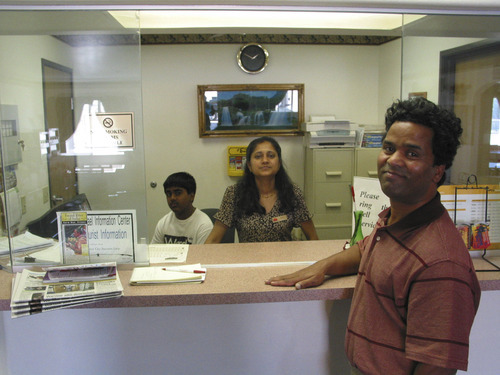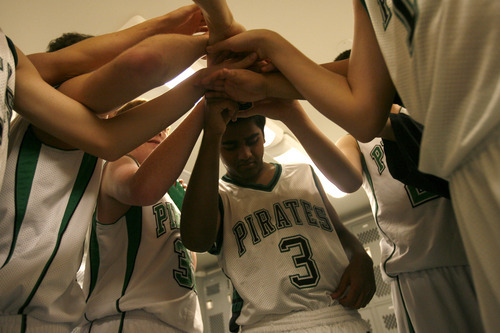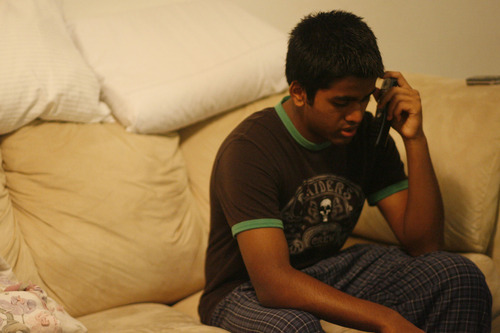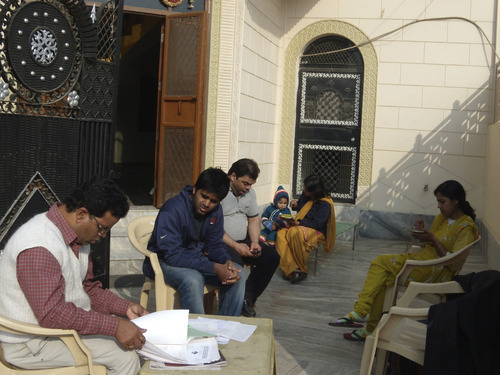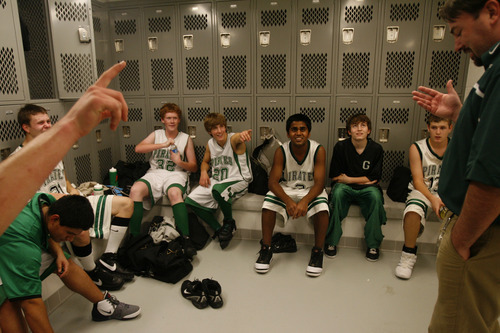This is an archived article that was published on sltrib.com in 2011, and information in the article may be outdated. It is provided only for personal research purposes and may not be reprinted.
Delhi, India • In stockinged feet, Kunal Sah sits cross-legged on a big sofa in his parents' comfortable home, surfing his laptop like a typical American teen.
The 17-year-old wears an easy smile. Dressed in denim pants and a pullover, Kunal looks like he might bound out the door any minute to join his pals in Green River.
But the world outside his door no longer smells like Pizza Hut or the burgers from Ray's Tavern, Green River's noted watering hole. Like everywhere else in India, cows and goats wander the street and women in colorful saris carry big loads on their heads.
Although Kunal is an American citizen by birthright, since August he has been in exile in Dwarka, a suburb of India's teeming capital, Delhi, population 22 million. He lives with his parents, Ken and Sarita, who in 2006 lost their bid to remain in the U.S. after 16 years of legal residency.
To ease his homesickness, Kunal tracks his friends on Facebook. He also works online toward a high school diploma in the hope that his future will be brighter.
"All the things that have happened in the last 4 1/2 years aren't normal," Kunal said. "It's hard to take in for a 17-year-old."
—
The American dream, dashed • Sarita, 39, wears colorful, traditional Indian garb as she scurries to fix breakfast for visiting relatives. Spicy aromas waft from the kitchen.
"Since we have come here, we are going through a hard time, the three of us," Sarita said. "Every day I think of Green River. Everything we have worked for is there."
Outside on the family patio, Ken eats his breakfast noodles. It's warmer in the courtyard than in the house, but Ken is wearing a sweater vest over his button-down shirt. He's pensive as he looks over documents, mulling what he could say to U.S. immigration officials that might help the family get a visa that would enable them to return to the United States.
"It's difficult to build a new life in India," said 45-year-old Ken. "We are so confused. How can I start anything new when everything is over there? I can't engage myself."
Like most immigration stories, the Sahs' is complicated. In 1990, Ken entered the country on a student visa to study aircraft mechanics in Oakland, Calif. Soon, Sarita joined him. Eventually, the couple sought permanent worker status through a petition for asylum.
They worked at any number of jobs to pay for housing and education and put a little away in savings. When Ken could not find employment as an aircraft mechanic, he and Sarita worked even harder to save money. In 1997, when Kunal was 2, they were able to buy the small, rundown Budget Inn in Green River. In time, they spruced up the place and built a second hotel in town, the Ramada Limited.
What they couldn't predict was that Sept. 11, 2001, would dramatically affect immigrants working within the system to obtain permanent worker status. While an estimated 12 million to 15 million people live in the U.S. illegally, the Sahs say they would never consider staying without permission.
"Honesty is still the best policy," Sarita said.
At the same time, they can't understand why they weren't allowed to remain in Utah after building two successful businesses, paying taxes and providing employment for others.
"It was the American dream and we made it," Ken said. "But before we could enjoy it, happiness was snatched away from us."
—
Kunal finds trouble • In Green River, Kunal was a straight-A student. Many of his classmates looked to him for help with math and computers. For two consecutive years, when he was 12 and 13, he represented Utah at the National Spelling Bee in Washington, D.C. At one point, he had set his sights on attending Harvard University and becoming a physician.
For almost a decade, Ken and Sarita had waited without word for a ruling from immigration officials. Then suddenly, in 2000, their petition for asylum was denied without explanation just shy of 10 years from the date they had applied. Still, they believed their status could be amended, like that of many other immigrants.
But the ground shifted after 9/11, and a subsequent application was shot down in May 2004. Frantically, they sought help from Utah Republican Sen. Orrin Hatch. While Hatch offered guidance, he refused to sponsor legislation that would help the Sahs gain citizenship. In August 2005, the federal 10th Circuit Court of Appeals dismissed their appeal.
When Kunal was the face of Utah at the national bee in 2006, his parents were on the verge of being forced to leave the country.
"It's like someone smashing your life," Ken said.
Their hopes dashed, the Sahs focused on the future of their son, who had yet to turn 13. They made the difficult decision to leave him behind in the care of his uncle to complete schooling in the United States. It's a decision that continues to haunt them.
Those 41/2 years of separation were painful, Sarita recalled. "I would wake up in the middle of the night crying. I don't have words for it."
Ken's brother, D.C. Prasad, who does have permanent resident status, stepped in to run the hotels and care for Kunal, all while starting his own family. It's been a challenge for him, too. Prasad married an Indian woman who then had to return to India to obtain a visa to remain legally in the U.S. She took their baby with her.
Between his job, supervising Kunal and trying to sort through his wife's immigration problems, Prasad had his hands full. "All I do is work," he said.
Ken knows his brother will not be able to stay in Green River indefinitely. And he fears that if he can't return before his brother leaves, he will lose the hotels.
Looking back, Kunal says his parents' departure was overwhelming. For the first years, he survived on hope that the loss was temporary.
"I didn't know what was going on. I just knew I wanted to be with my parents," he said. "I began writing to Senator Hatch's office and to the Bush administration. But I never got a response."
Still, he kept it together, studying hard at school, playing on the basketball team and working at the hotel every afternoon and on weekends. Although he talked to his parents almost every day, it wasn't the same as having them there. By the fourth year, his slowly boiling anger came to a head and he spun out of control.
"It's like my parents aren't here and I'm going to have a party. That was my mentality," he said.
About the time he turned 16, Kunal got in trouble with the law. Because he is a minor, his record is not public. Without sharing details, Kunal says he has learned a hard lesson from the experience. And he takes responsibility for his misdeeds.
"There were mistakes I made in February 2010," Kunal said. "I didn't want to plead 'not guilty' because I did make the mistakes."
He spent several months in detention, missing a portion of his junior year at Green River High School. He then was ordered into foster care in Price, where he attended Carbon High School.
But Kunal wasn't happy in foster care. His once straight-A record was blemished by his forced absence and the dream of Harvard began to fade. His parents decided it was time for Kunal to be with them.
Sarita said none of it would have happened had they been able to stay in Green River. "The way that you can take care of your child, no one else can," Sarita said. "What happened was because we were not there."
Last August, Kunal was allowed by the court to go to India and live under his parents' supervision until he is 18. But the reunion is bittersweet.
"He is here now," Sarita said with a sigh. "But the way he is here is not good. He wanted more than anything to throw his hat in the air at [high school] graduation."
—
Another disappointment • Sarita tries to stay busy around the house cleaning, cooking and looking for ways to keep her son happy. Ken searches for business opportunities in Delhi. But, for the most part, they are biding their time, waiting for a way to get back to Utah.
"When we were there, we were prospering," Sarita said. "Over here, we are doing nothing, zero."
Kunal's future, too, is anything but clear. He imagines a life far from the chaos of Delhi, where he and his parents would live out their American dream. "In my dreams, my parents are living in a house I built for them in the United States," he said.
He's still trying to help them. Kunal had made an appointment at the U.S. consulate in Delhi for Jan. 12. He hoped he could explain their plight, that reason would prevail, and Ken and Sarita would be granted visas to return to Green River.
"I didn't even know how to make an appointment," Kunal said. "I just went online and checked the box for 'other services.' "
Shortly before noon that day, the family headed to the U.S. Embassy. During the drive, Kunal kept rehearsing what he would say, looking for the words that would convince someone, anyone, that they should be allowed to return to Utah, even for a visit.
Inside the manicured and well-guarded compound, the man behind the window at the Citizens Services Center politely listened to Kunal's story as his father looked on.
The agent told them that Ken and Sarita must apply for a visa at a different department at the consulate. But he noted that their close ties to Green River would work against them. "If a hearing officer gets the slightest inkling that you might not come back, he has to deny you," the agent told them.
Ken told the agent that didn't make sense. "We were there and we left willingly," he said. "We just want to travel to the U.S. twice a year to look after our business. That's all we ask."
"I'm sorry," the agent said. "The law is what it is."
Kunal was silent. But as they left the embassy, Ken said he would remain hopeful.
"We must keep the spirit. We must keep trying," he said. "That's how things happen. One day we will be back there."
—
Uncertain future • It could happen. But most likely, it won't happen quickly.
Kunal hopes to attend college in the U.S. as soon as next year, although that is anything but certain. When he turns 21 in September 2014, Kunal can apply to sponsor his parents into the United States. How quickly such an application would be processed is unclear.
Steve Laurence, the Sahs' immigration attorney in Salt Lake City, said such paperwork could easily take a year. That would mean fall of 2015 would be the soonest Ken and Sarita could return to Green River, barring something unforeseen.
While the strain of what they've been through in the last 11 years is visible, the Sahs refuse to give in.
"I came to India from Price. I went to Price from Green River," Kunal said. "I'm trying to take a positive attitude from the experience."
One of those positives is Janessa Woodward, whom he met in a writing class at Carbon High School in Price. The pair correspond online and talk on Skype regularly.
"I just got out of detention and I was down and she held out a hand for me," Kunal said. "She's a special person."
Woodward, who now lives in South Ogden, said Kunal's story is "heartbreaking."
"He was just a little kid when it went down," she said of the immigration battle. "He loves his parents, but he wants to be home in this country."
That feeling is shared by others in southern Utah, including Patsy Stoddard, the editor of the Emery County Progress newspaper in Castle Dale. She characterizes the Sahs as valuable community members who attempted to work within the immigration system.
"It was really tough for Kunal to have his parents leave at such a vulnerable age," she said. "Green River is such a tiny place and India is so big. I'm sure it's a difficult transition for him."
Fortunately, Kunal is fluent in Hindi, the common language of northern India. And he's not a complete stranger to the culture.
When he's not at his computer, Kunal likes to go to a nearby recreation complex to shoot hoops or join in a pickup game of basketball. He laments that he has no close friends in India.
But Kunal does have a new dream: He wants to earn an MBA degree and build upon his father's success in the lodging business.
"I want to go back and go to college," he said. "My dream is to open a hotel chain in the United States, like Conrad Hilton."
It's a dream the Sahs cling to day by day, hour by hour, minute by minute. But from Delhi, the American dream looks a long way off.
Reporter Christopher Smart has been following the story of the Sah family since 2006 and recently caught up with them during a visit to India.


